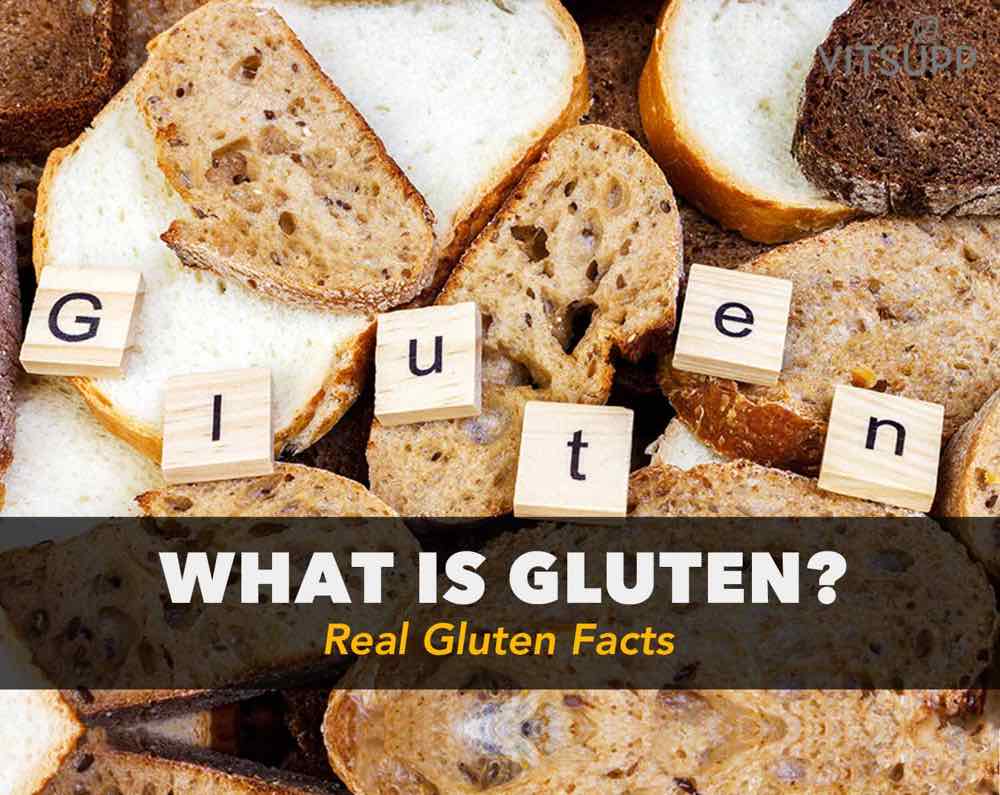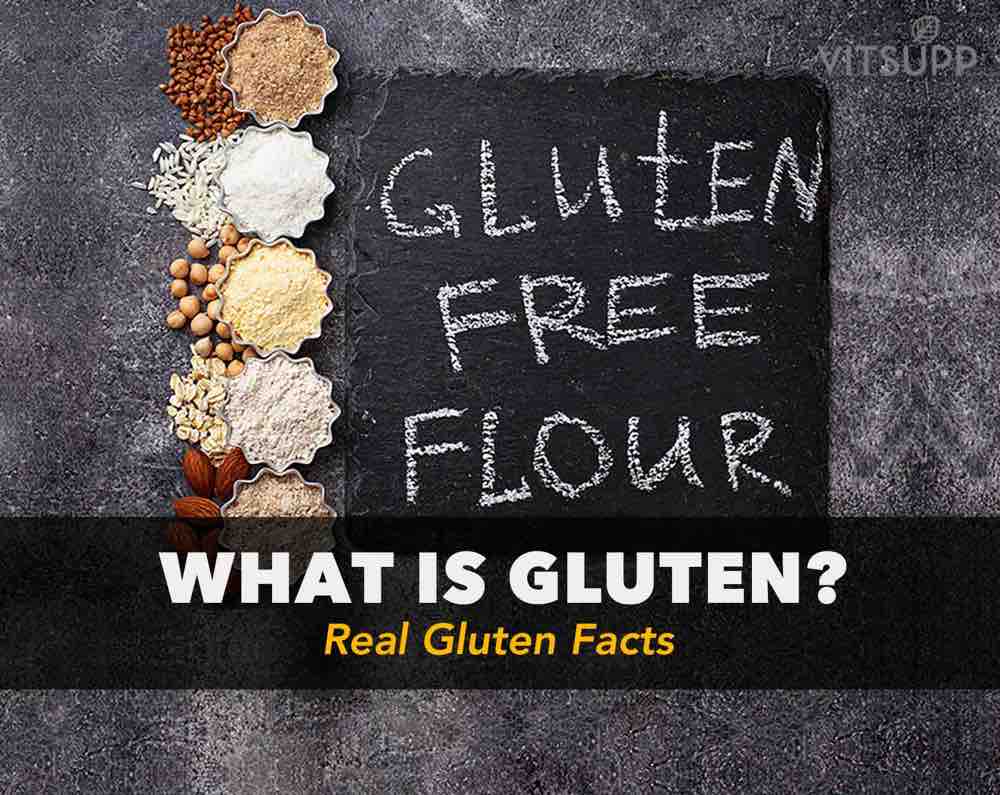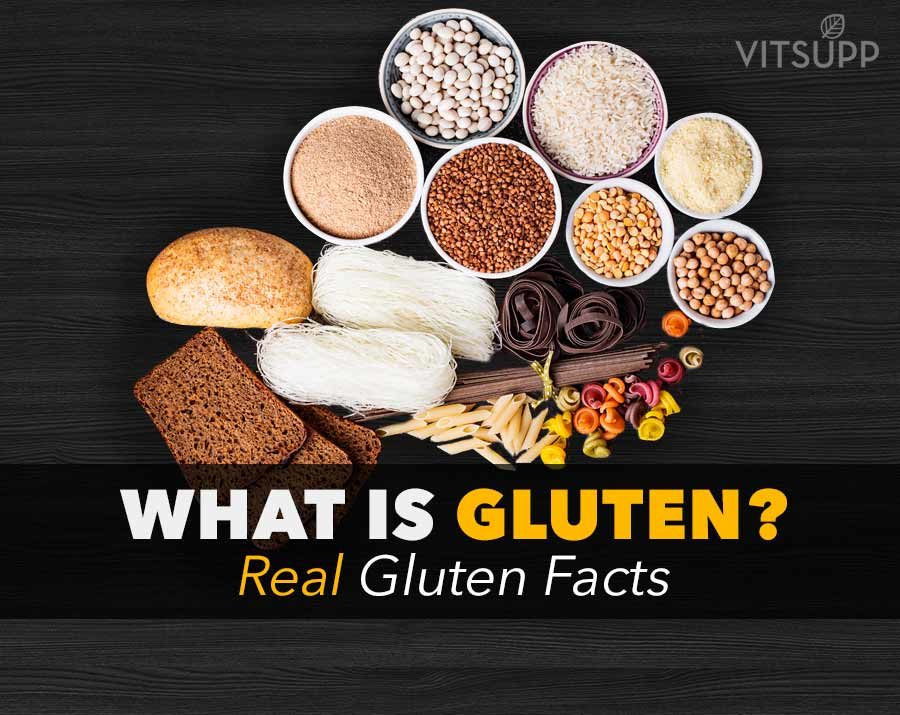You must have heard the word “gluten-free” when reading your favourite wellness blog. Many wellness experts say that gluten-free foods are healthier, but what is gluten and gluten made of? If these questions are in your mind, read on!
Many common types of foods that we consume contain a significant amount of gluten. Such foods include bread, chapatis made from wheat, soups, cakes, cookies, beer, and pastries.
Gluten has recently been a common buzzword. From gluten-free foods and diets to health disorders associated with it, a lot is being said about this particular type of protein. Since gluten is mainly found in wheat, barley, and rye, can it be good for you?
Is a gluten-free diet a more sensible approach to healthy eating than one that contains gluten? Will cutting out gluten from your diet do more harm than good? Read on to find out.
Contents
- What is gluten?
- Where Does Gluten Come From?
- Gluten Meaning in English
- List of Gluten Foods in India
- What Is A Gluten-Free Diet?
- How To Get Started With A Gluten-Free Diet
- Who Should Eat A Gluten-Free Diet?
- Can You Go Gluten-Free To Lose Weight?
- Gluten-Free Foods
- What is Gluten Intolerance
- Gluten side effects
- Gluten intolerance test
- Suspecting Gluten intolerance – foods to avoid
- Is gluten good for health?
- Why is gluten bad for Health?
- Does rice contain gluten?
- Are There Risks To Trying A Gluten-Free Diet If You Don’t Have Celiac Disease?
- Will I Go Through Gluten Withdrawal If I Start Eating Gluten-Free?
- Dispelling Gluten Myths: What You Need to Know
- In conclusion
- FAQ’s
What is gluten?
Gluten refers to a group of proteins. The two main proteins that are found in gluten include glutelins and prolamins. It is usually found in food grains such as rye, wheat, barley, and spelt. Essentially, the function of gluten is to give these grains their shape by acting as a sort of glue, which holds these foods together in place.

We have asked Trista Best, a registered dietitian at Balance One Supplements, to explain what gluten is. She said, “Gluten is a general name used in the food, health, and medical communities to describe a group of proteins found in wheat, rye, barley, and triticale. Some people can be sensitive to gluten, which can cause brain fog, gastrointestinal distress, and inflammation.”
Wheat bread is the most commonly consumed form of gluten. The proteins found in wheat have a large amount of gluten present in it – 75 to 80% of wheat bread consists of gluten. In fact, the airy, puffy texture of bread is mainly from gluten. The elasticity that you find in the dough is also due to the presence of gluten.
Gluten is popular in the food industry. However, gluten is used extensively in beauty products, medications, and a few supplements.
Gluten happens to trigger a few immunological, autoimmune, and inflammatory reactions in the body, for those who are either gluten intolerant or allergic to gluten. In fact, a wide range of disease falls under the bracket of gluten-related disorders.
One such disease is celiac disease. Other disorders include dermatitis herpetiformis, non-celiac gluten sensitivity, and gluten ataxia. The most common way to treat gluten-related disorders is by making the switch to a gluten-free diet. (13)

Where Does Gluten Come From?
The natural protein composite called gluten comes from the seeds of specific plants, such as wheat, rye, barley, and their hybrids. Gluten is formed in the endosperm of these plants. While gluten can be found naturally in these grains, it is added externally to some processed food for culinary purposes.
Wheat is the primary source of gluten. Besides common wheat, it is also found in durum, semolina, spelt, farro, etc., specialized forms of wheat. Gluten is also found in barley, rye, and triticale. Triticale is a hybrid of rye and wheat, thereby making it a key source of gluten.
Gluten Meaning in English
Gluten means “glue”, in Latin. This group of protein can hold food together and give it shape. It is because of this attribute that gluten gets its name. It has adhesive properties, and it can also give elasticity, especially in the form of dough.
It is a protein that gives bread its airy and fluffy texture and dough its sticky texture. It’s also used as a stabilizing agent in many processed foods, such as desserts, salad dressings and mayonnaise.
Real Gluten facts – You do not know:
It is in almost everything from beauty products to packaged foods to medications and supplements.
Gluten is found in some grains, mainly wheat. Almost all children with Autism have Gastrointestinal (GI) Disturbances. Some even have Irritable Bowel Syndrome (IBS) or Leaky Gut Syndrome. These disorders are linked to gluten. Also, they are seen in varying degrees in patients of Autism, ADHD and related disorders.
Gluten Meaning in Hindi
Gluten in hindi: लस या आटे का लस
यह एक प्रोटीन पदार्थ है जो स्टार्च को अनाज के दानों से निकाल देने के बाद बचता है। यह आते को सामंजस्य देता है
ग्लूटेन प्रोटीन के एक समूह को संदर्भित करता है। ग्लूटेन में पाए जाने वाले दो मुख्य प्रोटीनों में ग्लूटेलिन और प्रोलेमिन शामिल हैं। यह आमतौर पर राई, गेहूं, जौ, और वर्तनी जैसे खाद्य अनाज में पाया जाता है।
अनिवार्य रूप से, लस का कार्य इन अनाजों को एक प्रकार का गोंद के रूप में कार्य करके, इन अनाजों को देना है, जो इन खाद्य पदार्थों को एक साथ रखता है।
गेहूं की रोटी लस का सबसे सामान्य रूप से सेवन किया जाता है, और 75 से 80% से अधिक गेहूं की रोटी में लस होता है। वास्तव में, रोटी की हवादार, झोंके बनावट मुख्य रूप से लस से होती है।
आटा में जो लोच आप पाते हैं, वह लस की उपस्थिति के कारण ही है।
Gluten meaning in Tamil
பசையம் என்பது புரதங்களின் குழுவைக் குறிக்கிறது. பசையத்தில் காணப்படும் இரண்டு முக்கிய புரதங்களில் குளுட்டிலின்கள் மற்றும் புரோலமின்கள் அடங்கும். இது பொதுவாக கம்பு, கோதுமை, பார்லி மற்றும் எழுத்துப்பிழை போன்ற உணவு தானியங்களில் காணப்படுகிறது. அடிப்படையில், பசையத்தின் செயல்பாடு, இந்த தானியங்களுக்கு அதன் வடிவத்தை கொடுப்பதே, ஒரு வகையான பசை போல செயல்படுவதன் மூலம், இந்த உணவுகளை ஒன்றாக வைத்திருக்கும்.
கோதுமை ரொட்டி பொதுவாக பசையம் உட்கொள்ளும் வடிவமாகும், மேலும் 75 முதல் 80% க்கும் அதிகமான கோதுமை ரொட்டியில் பசையம் உள்ளது. உண்மையில், ரொட்டியின் காற்றோட்டமான, வீங்கிய அமைப்பு முக்கியமாக பசையத்திலிருந்து வருகிறது.
மாவில் நீங்கள் காணும் நெகிழ்ச்சித்தன்மையும் பசையம் இருப்பதால் தான்.
List of Gluten Foods in India
Here are all the foods that contain gluten:
- Wheat
- Rye
- Barley
- Spelt
- Pasta
- Bread
- Beer
- Bulgur
- Semolina
- Triticale
- Cereals
- Cookies
- Cakes
- Kamut Matzo
- Farina
- Seitan
- Cream sauces
- Malt extracts
- Oats
- Soy Sauce
- Beer
Out of these, wheat is the most commonly consumed form of gluten. The three main sources of gluten, are wheat, barley, rye.
The gluten from wheat is commonly found in foods like bread, soup, pasta, roux, and other baked goods. The gluten from rye is commonly found in foods such as cereals, rye beer, and bread made from rye.
Most Gluten Rich Foods List
- All-purpose flour
- Rye Flour
- Whole Grain Bread
- White Bread
- Wheat Crackers
- Spelt Bread
- Rye Bread
- Pot Barley
- Pizza Tops
- Multigrain Bagel
- Nutrigrain Bar
- Dry Penne Pasta (Source)
Unexpected Gluten Foods
- Beers made from wheat and rye contain significant amounts of gluten.
- The gluten from barley is commonly found in foods such as beer, soups, food colouring, malt flavouring, malt extract, malted milkshakes, and malted barley flour. (19)
- Vegetables in cans or in ready meals are not tolerated if they contain certain emulsifiers, preservatives, thickening agents, stabilisers or starch!
- Fruit fillings tend to contain thickening agents and starch
- Several types of cheese contain thickening agents.
- Sausage products and cold meats are often not gluten-free.
- Fish products, preserved fish, fish in batter.
- Bread crumbs contain gluten.
- Margarine and vegetable oils need to be checked for unsuitable additives.
- Instant coffee, granulated coffee, ready-made coffee or cocoa (e.g. from drinks machines), beer, malt drinks
- Seitan (wheat gluten)
Labels with Hidden Gluten
If you find the following on your food labels, chances are that it contains gluten:
- Maltodextrin
- Added Vegetable Protein
- Malts
- Starches
- Hydrolyzed vegetable protein (HVP)
- Texturized vegetable protein (TVP)
- Natural Flavouring
- Nature Identical Flavouring (17)
During processing and packaging, cross-contamination of these grains with gluten can and does occur, mostly because the same facility is used to process gluten-containing or wheat products. Gluten is commonly found (hidden) in many processed foods. Quite a few food additives are made from gluten-grains.
What Is A Gluten-Free Diet?
With a growing inclination towards a healthy diet, people are becoming more interested in opting for meals that do not add to their health implications. Gluten is not suitable for everyone, especially if you have gluten intolerance or celiac disease. In such a scenario, one must opt for a gluten-free diet. Now, you may wonder, “ what does gluten free mean “. This refers to an eating plan excluding gluten-containing grains or processed foods.
The individuals following a gluten-free diet do not consume any food or beverage that contains gluten. This includes various types of breads, pastas, baked items, and processed food. Such a diet revolves around food and grains that are naturally gluten-free. For instance, meat, fish, fruits, vegetables, rice, quinoa, etc.
How To Get Started With A Gluten-Free Diet
Firstly, make a list of the products that you must avoid. The food items that naturally contain gluten, such as wheat, rye, barley, or their hybrids, must be excluded from your eating plan. You must check for hidden gluten in processed foods like sauces, processed meats, etc.
Formulate a healthy diet with vegetables, fruits, meat, and poultry – the food products that are naturally free from gluten. This will help you to get nutrients without suffering from adverse health impacts. Make it a habit to read labels before buying any packaged food.
Who Should Eat A Gluten-Free Diet?
Gluten is not for everyone. It can worsen certain health conditions. Therefore, one must assess their health well before consuming food containing gluten. Below are some key points to remember in this context.
- If you suffer from celiac disease, then gluten is not for you. The gluten can damage the small intestine and block nutrient absorption.
- Gluten ataxia, an autoimmune condition, can worsen through consuming gluten-containing food products.
- Non-celiac gluten sensitivity should be taken seriously. It can cause diarrhoea, bloating, and abdominal pain without causing any internal damage.
- If you have a wheat allergy, you should not consider gluten. Also, individuals suffering from IBS (Irritable Bowel Syndrome) should skip it with the doctor’s advice.
Can You Go Gluten-Free To Lose Weight?
Weight management does not entirely depend on gluten intake. A gluten-free diet cannot guarantee weight loss. However, redefining your eating patterns and choice of food can certainly make significant changes to your body.It is advisable to cut short processed food intake and depend on whole foods more. At times, gluten-free processed food can be rich in calories and unhealthy. There is no solid study to back weight loss claim of healthy people caused by a gluten-free diet.

Gluten-Free Foods
| Grains | Corn (maize), rice, wild rice, buckwheat, millet, amaranth, quinoa |
| Vegetables | All fresh, frozen and dried types of vegetables. |
| Potatoes, and potato flour, sweet potatoes, tapioca, beans, peas, lentils, soya beans, edible chestnuts | |
| “Nuts” and seeds | Hazelnuts, walnuts, cashew nuts, Brazil nuts, peanuts, sunflower seeds, sesame seeds, poppy seeds, linseed (flaxseed), coconut |
| Fruits | All fresh, frozen and dried fruit types |
| Eggs | Both yoke and white |
| Dairy products | Milk, quark, natural yoghurt, cream, mature cheese, kefir, soured milk, whey |
| Meat | All types of meat, poultry and game, cooked and cured ham |
| Fish and shellfish | Fresh or smoked |
| Fats and Oils | Corn oil, rape oil (canola oil), olive oil, sunflower oil, butter, lard, peanut butter |
| Beverages | Fruit teas and infusions, herbal teas and infusions, juices, freshly brewed coffee |
| Other foods | Honey, tofu, soya milk, pure herbs (parsley, chives, mint, …) edible chestnuts |
Naturally Occurring Gluten-free Grains:
Do you want to try the gluten-free diet? Gluten-free grains are available. These grains are the best substitute for wheat, rye, and barley. You can use these grains for your own gluten-free recipes.
- Oats
- Millet
- Buckwheat
- Quinoa
- Sorghum
- Soy
- Flax
- Amaranth
- Rice
- Chia Coconut Protein Pancakes
What is Gluten Intolerance
Gluten intolerance is a medical condition which affects the autoimmune system and digestive tract. It happens to be a relatively common disorder. It essentially refers to the adverse reactions that your body might experience after the consumption of gluten.

We asked Lisa Richards, the nutritionist, and author of The Canadian Diet, to know how one can be considered gluten intolerant. She said, “Those with gluten sensitivity or celiac disease should follow a gluten-free diet. Certain conditions make people prone to inflammation, especially autoimmune diseases. It may be worth trying the gluten-free diet to determine if there is a link between autoimmune flare ups and gluten. The purpose of the gluten-free diet is primarily to reduce negative reactions in the body from either a gluten sensitivity or allergy.”
Gluten Intolerance Meaning
Gluten Intolerance involves the digestive system and leads to food allergy. If you are intolerant to gluten, your immune system overreacts to gluten foods causing symptoms that are potentially serious or even life-threatening.
One of the most common diseases associated with gluten intolerance is celiac disease. Celiac disease is an inherited autoimmune disorder that can damage the small intestine. There are gluten intolerance related disorders that are non-celiac in nature as well. Celiac disease, a form of gluten intolerance is a condition that affects the autoimmune system. It can cause several issues with the digestive system as well.
On average, close to 1% of the population suffers from celiac disease. There are other diseases that fall under the category of gluten intolerance, which is known as non-celiac diseases. (16)

We wanted to inquire about this topic from a registered dietitian and expert health writer, Ana Reisdorf at Wellness Verge. She said, “Gluten intolerance happens when your body has trouble digesting gluten, the protein found in wheat, barley, and rye. With gluten intolerance, an immune reaction occurs after consuming gluten that can damage the small intestine’s lining over time. If left untreated, it can prevent the absorption of important nutrients and cause nutritional deficiencies. If you regularly experience GI symptoms such as diarrhea, bloating, or gas, speak to your doctor about getting tested for gluten intolerance.”
Gluten intolerance symptoms
- Irritable bowel, diarrhoea OR constipation
- Mood Swings/ Depression
- Gastric Reflux
- Poor Growth/ Failure to thrive in children.
- Behavioural Problems in children
- Low Energy/ Exhaustion
- Headaches and Migraine
- ADHD
- Autoimmune Diseases such as Lupus, Eczema, Hypothyroidism etc. (16)
Real Gluten Facts – You do not know
Modern wheat has 50 times – yes, that’s right- 50 times the amount of gluten that was present in the older varieties that our ancestors ate.
Gluten side effects
If you have a gluten intolerance, you should avoid foods that contain gluten. Here are some of the common side effects of gluten allergy:
1. Autoimmune disorders
One of the signs that you have gluten intolerance is if you develop certain autoimmune disorders. In fact, celiac disease happens to be an autoimmune disorder. If you are suffering from celiac disease, your immune system will begin to attack your own digestive system, which contains gluten. (2)
Unfortunately, celiac disease paves the way to other autoimmune disorders as well, one of which is autoimmune thyroid disease.
It is worth noting that while the celiac disease can cause autoimmune disorders, if you are suffering from non-celiac gluten sensitivity, then there are no risks associated with autoimmune disorders. (1)
2. Bloating
Bloating is another common sign that is associated with gluten intolerance. When you feel bloated, your stomach feels full and swollen or full of gas. Bloating is associated with several other disorders, including irritable bowel syndrome, but it is one of the most common signs of gluten intolerance. According to one study, it was observed that 87% of the candidates who were suffering from non-celiac related gluten sensitivity also experienced bloating. (3) This is one of the most common gluten effects on body if you are gluten intolerant.
3. Pain in the abdomen
Like bloating, pain in the abdomen is one of the most common signs of gluten intolerance. Over 83% of people who suffer from gluten intolerance complain of abdominal discomfort or pain. (4)
4. Diarrhoea and constipation
Diarrhoea and constipation are both signs of gluten intolerance. It can be a symptom of other underlying causes as well. Both diarrhoea and constipation take place because of your body’s inability to absorb nutrition. Gluten intolerance can worsen this condition.
In the case of diarrhoea, patients who suffer from celiac disease often observe foul-smelling faeces as well. Consuming gluten can cause intestinal damage to people who have a wheat allergy and gluten allergy. (5)
5. Gluten Allergy Skin Rash
Your skin can get affected if you are suffering from gluten intolerance as well. One of the skin diseases associated with gluten intolerance is dermatitis herpetiformis. It is the manifestation of celiac disease in your skin. Other skin disorders associated with gluten intolerance are psoriasis, chronic urticaria, and alopecia areata. (6)
6. Anxiety
Close to 3 to 30% of the world’s population suffers from anxiety. Studies have shown that people who suffer from gluten intolerance are more prone to anxiety as opposed to people who do not have a gluten intolerance.
In one study it was observed that 40% of the people who suffered from gluten intolerance also complained of regular bouts of anxiety. (7)
7. Depression
Like anxiety, depression happens to be associated with gluten intolerance. This happens because gluten can affect serotonin levels in the brain. Serotonin, that is found in the brain, is a neurotransmitter. Also known as the happiness hormone, an imbalance in this is a causal factor of depression.
Another way that gluten can cause depression is with the formation of gluten peptides. These gluten peptides are formed when the body digests the gluten. It can interfere with the function of the central nervous system, thereby paving the way to depression.
When your body is intolerant to gluten, it can form a rise in the number of harmful bacteria in the gut. This again can mess with the activities in the central nervous system and cause depression. (8)
8. Fatigue
Fatigue is a common sign of gluten intolerance. Individuals who suffer from gluten intolerance particular complain of fatigue after a meal that consists of gluten. Over 60% to 80% of the patients who suffer from gluten intolerance have complained of fatigue as well. (9)
9. Headache
Patients who suffer from gluten intolerance have complained of migraine or headache as well. In fact, those who suffer from gluten intolerance are more prone to migraine, as opposed to people who don’t.(10)
10. Iron deficiency anaemia
Iron deficiency anaemia is often observed in those suffering from celiac disease. If you are suffering from iron deficiency anaemia, then the small intestine’s tends to struggle with the absorption of nutrients. When this happens, the body does not absorb enough iron content from the food that you consume. (11)
11. Weight loss
If you have experienced sudden weight loss then you should be aware that it is one of the signs of gluten intolerance. This is caused due to the body’s inability to fully absorb the necessary nutrients from the food you consume. It can also be due to the other side effects of gluten intolerance like diarrhoea and digestive issues. (12)
What are you doing to avoid the side effects of gluten intolerance?
Gluten intolerance test
There are no straightforward tests to check for gluten intolerance. Most of the time, gluten intolerance is diagnosed by exclusion. First, a test is done to check if you are suffering from celiac disease. After this, tests are conducted to check for non-celiac gluten intolerance.
1. Gluten Allergy Test Kit
There are a few kits available, that can help you check if you are suffering from gluten intolerance. Usually, it requires a sample of your blood or stool. However, these tests are usually unreliable, and doctors advise against it. It is unreliable because it often shows false positive, especially if you are suffering from other allergic conditions.
2. Gluten Allergy Test
Getting a medically approved test is the most reliable way to identify if you have a gluten intolerance. Celiac disease test is the first type of test that you will have to take. It determines the possibility of celiac disease. Once this has been done, various other tests like blood tests, issue Transglutaminase IgA antibody test, IgA Endomysial antibody (EMA) test, Total serum IgA test, or Deamidated gliadin peptide (DGP) test can be conducted to determine the possibility of gluten intolerance. (18)
Suspecting Gluten intolerance – foods to avoid
If you are suffering from gluten intolerance then you must avoid all gluten-containing foods
- Stay away from Most Gluten Rich Foods at all cost
- Watch out for Unexpected Gluten Foods
- Be careful while buying goods in the market and read the Labels to avoid Hidden Gluten
Is gluten good for health?
The consumption of gluten has been a controversial topic. Bread, pasta, beer, and soups are a few common foods that are rich in gluten. While people who suffer from gluten intolerance should steer clear from foods that contain gluten, the jury is still out on whether people who are tolerant of gluten should consume it.
Gluten Good or Bad
There is no compelling study that backs the fact that staying away from gluten can do anything significantly good for your health. Some research claims that removing the consumption of gluten from your diet, or a gluten-free diet might, in fact, be harmful because you tend to miss out on the nutrients that are present in whole grains like wheat, rye, or barley.
While it is advisable to stay away from foods that contain gluten if you are suffering from celiac disease or are gluten intolerant, you do not have to worry about consciously eliminating gluten from your diet if you are hale and healthy. Gluten rich grains have several complex carbohydrates that are essential for your body. They also contain folates, Vitamin B, and fibre, all of which are key nutrients that your body requires. (14)
Why is gluten bad for Health?
People who are suffering from celiac disease or other gluten-related disorders must avoid gluten. This is because you may experience adverse reactions. Here are the reasons why gluten can be bad for you.
1. It can cause inflammation in the gut, which in turn can lead to the build-up of harmful bacteria, diarrhoea, stomach pain, constipation, and bloating.
2. Gluten can also lead to a condition known as intestinal permeability. This condition is also known as a leaky gut. It is characterised by the inability of the intestine to block food from leaving through the walls of the intestine.
3. Your immune system tends to take a big hit if you are suffering from a reaction to the consumption of gluten. In some cases, such as celiac disease, the immune system begins to attack the digestive system after the consumption of gluten.
4. Consuming gluten can also have an adverse effect on your brain. Brain-related disorders like anxiety, depression, brain fog, and fatigue are all associated with gluten intolerance. This is because gluten can interfere with the functioning of the central nervous system as well as hormones like serotonin.
5. Gluten can be bad for your skin as well, leading to problems like dermatitis herpetiformis.(15)
Does rice contain gluten?
People have a common misconception that rice contains gluten. However, the truth is that rice in it natural form is, in fact, gluten-free. White rice, wild rice, as well as brown rice, are all free from gluten.
People with celiac disease are often advised to consume rice thanks to its gluten-free quality. Chapatis made from rice flour are gluten-free. Similarly, puffed rice does not have gluten either.
However, there are a few cases where the rice you consume is not gluten-free. This happens when you cook rice with other products that contain gluten. For example, making rice with certain sauces like soy can make the rice rich with gluten as well.
Another case where the rice you consume might contain gluten is if it has a cross-contact with other gluten-rich grains like wheat, rye, and barley. To avoid this, you will have to buy rice that comes with a label that says it is gluten-free.
Are There Risks To Trying A Gluten-Free Diet If You Don’t Have Celiac Disease?
Physicians advise a gluten-free diet to prevent certain health conditions from worsening. However, if one follows a gluten-free eating plan without medical necessity, that might pose significant health implications for the concerned individual.
- If you avoid gluten without any specific reason, you may miss a whole lot of nutrients, too. This will result in nutritional deficiencies without appropriate substitutes.
- Sometimes, gluten-free alternatives are high in sugar content or fat. This can have ill effects on your health.
- Unless you don’t have to buy gluten-free food items, do not opt for them as they are too pricey and can unnecessarily take a toll on your financial health.
- With lower consumption of whole grains like wheat, your gut health will be compromised.
- Diet restrictions can have a negative impact on mental health. Hence, one must not follow it unless it is medically prescribed.
Will I Go Through Gluten Withdrawal If I Start Eating Gluten-Free?
The term withdrawal is mostly used for addictive substances, such as drugs. Gluten is a nutrient-dense group of proteins that cannot result in addiction. While there is no medically known term for gluten withdrawal, it is important to understand the underlying aspects associated with transitioning to an eating plan that is completely free of gluten.
However, you might experience temporary emotional and physical changes after switching to a gluten-free diet. The situation will be worse if you are used to consuming lots of food products containing gluten on a regular basis.
Dietary adjustment, placebo/ nocebo effect, gut microbiome changes, nutrient deficiencies, and undiagnosed sensitivity are key contributing factors to these changes. Mood swings, fatigue, constipation, low energy, etc., are some key symptoms to look out for. .
Dispelling Gluten Myths: What You Need to Know
Myth: Gluten-free diets are healthier for everyone
Truth: Gluten-free diets are only necessary for people with celiac disease, a severe autoimmune disorder in which gluten damages the small intestine. For people without celiac disease, gluten-free diets may be unnecessary and harmful. In some cases, gluten-free diets can lead to deficiencies in essential nutrients such as fiber and iron.
Myth: Gluten-free products are low in calories
Truth: Gluten-free products are often made with alternative flavors such as rice, potato, or corn, which can be high in calories. In addition, gluten-free products may contain added sugars or fats to make up for the lack of gluten. This means that gluten-free products can be just as high in calories as their gluten-containing counterparts.
Myth: Gluten causes weight gain
Truth: Gluten itself does not cause weight gain. However, people who follow a gluten-free diet may consume more calories from alternative flour and added sugars, which can lead to weight gain. Additionally, people with celiac disease may experience weight gain after starting a gluten-free diet, as the small intestine heals and begins to absorb nutrients properly.
Myth: Gluten causes autism
Truth: No scientific evidence supports the claim that gluten causes autism. Studies have found no link between gluten consumption and an autism spectrum disorder. However, some individuals with autism may have difficulty digesting gluten, and a gluten-free diet may be recommended in those cases.
Myth: Gluten-free products are always healthier
Truth: Just because a product is labeled gluten-free, it does not automatically make it healthier. Gluten-free products can still contain high levels of sugar, fat, and sodium and may not be as nutritious as whole grain products that contain gluten. Reading the ingredient list and nutrition information on gluten-free products is essential to ensure they align with a healthy diet.
Myth: Gluten is only found in wheat
Truth: Gluten is a protein found in wheat, barley, and rye. However, it can also be found in many processed foods, such as sauces, dressings, and medications. It is important to read ingredient labels carefully and be aware of potential sources of gluten in your diet.
Myth: Gluten intolerance is the same as celiac disease
Truth: Gluten intolerance and celiac disease are not the same things. Gluten intolerance refers to symptoms such as bloating, gas, or stomach discomfort that occur after consuming gluten but do not cause damage to the small intestine. Celiac disease is a severe autoimmune disorder that damages the small intestine when gluten is consumed and requires a strict gluten-free diet for treatment.
Overall, it is essential to consult a healthcare professional before making any significant changes to your diet, especially if you have a medical condition or suspect you may have one. They can help you identify dietary needs and recommend the best action.
In conclusion
The consumption of gluten should be avoided by people who are suffering from celiac disease and those who are suffering from gluten intolerance. If you think you are intolerant to gluten and show signs or symptoms of gluten intolerance, talk to your doctor and get a diagnosis so you can treat this condition with immediate effect.
There is a lot of talk about inculcating a gluten-free diet into your lifestyle. However, this should not be done if you are not suffering from adverse reactions to gluten or if you are not intolerant to gluten. In doing so, you will be cutting out a lot of essential nutrients that gluten-rich foods contain. Always talk to a healthcare professional before proceeding with a lifestyle change such as a gluten-free diet. Keep following VitSupp to learn more about health and wellness
FAQ’s
If you are suffering from gluten intolerance, then you must avoid all gluten-containing foods. Gluten is not something anyone can consume. One must be fully aware of its cons before consuming it. There are certain health conditions, like celiac disease, which worsen if the concerned individual consumes gluten-rich food. There are some key points to remember if you are not wary of the side effects of gluten.
Stay away from Most Gluten Rich Foods at all cost
Watch out for Unexpected Gluten Foods
Be careful while buying goods in the market and read the Labels to avoid Hidden Gluten
Gluten is known as लस या आटे का लस in Hindi.
The people who understand Hindi only can say लस whenever they are referring to gluten. Gluten-free meaning in Hindi is बिना लस वाली. For example, gluten-free bread can be referred to as बिना लस वाली रोटी, which is ideal for those with gluten intolerance. With the growing inclination towards health consciousness, there are specific foods or agents that are coming to light; gluten is one of them. As more people seek gluten-free food sources, it has become integral to learn different names of gluten in various languages, like Hindi.
.
People have a common misconception that rice contains gluten. However, the truth is that rice in it natural form is, in fact, gluten-free. White rice, wild rice, as well as brown rice, are all free from gluten.
People who are suffering from celiac disease or other gluten-related disorders must avoid gluten. This is because you may experience adverse reactions.
A lot of people ask us this question. Well, the answer to the question: Do Oats have gluten is – It depends.
Oats in its natural form does not contain gluten. It contains a protein called avenins, which is non-toxic and tolerated by most celiac disease patients. (source)
However, most of the oats are processed in plants that process other gluten-containing grains and thereby it may be contaminated with gluten.
Maida is flour made from wheat. It contains gluten because wheat has gluten. One can prepare maida by removing the germ and bran of the wheat grain. That leaves only the endosperm. Gluten naturally forms in this part. The maida flour comes after grinding the endosperm. However, this process removes all nutrients and results in a soft and smooth texture.
Regular maida has gluten. However, alternatives available on the market are from rice or jowar and do not contain gluten. Hence, you can lean on gluten-free alternatives if you are gluten-sensitive.
Gluten refers to a family of proteins, such as Gliadin and Glutenin. As the name is derived from ‘glue’, it creates a sticky formula when mixed with water. Gluten enables the dough to become elastic and gives it a stretchy texture. Therefore, the dough rises by trapping the gas bubbles inside it during fermentation.
Gluten is a great binding agent due to its sticky texture. It adds chewiness to the baked goods. It helps in leavening by trapping carbon dioxide inside so that the dough rises. Despite lacking certain essential amino acids, gluten is a key nutritional source of protein. With the surge of a gluten-free diet, one must be careful before taking up gluten. Although it is bad for certain conditions like celiac disease, gluten remains important for food science.
Gluten is a group of proteins that form a sticky texture in the flour dough after coming in contact with water. Due to this property, it is considered a crucial binding agent. Gliadin and Glutenin are two major proteins found in gluten. While it is nutritious and safe, gluten should be consumed after being fully aware of its properties.
Gluten is harmful for people with certain health conditions. Sometimes, individuals are allergic to gluten. Hence, they are prescribed a gluten free diet. In such cases, it is necessary to avoid gluten. For individuals with celiac disease, strict avoidance of gluten is mandatory. It is an autoimmune disorder that becomes aggressive with gluten consumption, affecting the small intestine.
Gluten aware is a term to emphasize the mindfulness of its presence in certain food items. However, it lacks the conformity that is present in gluten-free food. There is a thin line of certification between gluten aware and gluten-free. The second option is safer for individuals with celiac disease or allergies.
When a food is made without using ingredients containing gluten, it is tagged as gluten-aware. However, it does not guarantee a hundred percent absence of gluten due to shared equipment in a kitchen. This might lead to cross-contamination. On the contrary, certified gluten-free food is completely free of it, making it safe for consumption for those with medical obligations.
Gluten aware is for general awareness, while the term gluten-free emphasizes strict awareness. It is essential to understand the difference between these two to ensure the overall safety of the consumer.
Gluten is a group of proteins that is used for culinary purposes, such as a binding agent. It has a sticky texture and allows the dough to be elastic and rise quickly. Primarily, it is used to provide structure to the baked items. Gluten is found in barley, wheat, rye, etc. When it comes to composition, wheat contains glutenin and gluten, barley contains hordein, and rye contains secalin.
Gluten purpose is to make baked food chewy and give it a shape. There are health conditions like celiac disease where gluten must be strictly avoided. In such cases, contaminated food resulting from shared kitchen equipment can also cause major health implications to these individuals. Keep following VitSupp to learn more about health and wellness.
Anything that is made from wheat, barley, or rye has gluten in it. Triticale, a hybrid of wheat and rye, also comprises gluten. Therefore, gluten-intolerant individuals should avoid any food made from it. Wheat-based food items, such as pasta, bread, spaghetti, bagels, etc., are key sources of gluten. Baked goods like muffins, cake, and cookies are included as well.
Breakfast cereals also contain gluten, except for the ones that are certified gluten-free. Snacks like crackers, chips, and pretzels are sources of gluten. Healthy gluten free breakfast food is ideal for those with health implications. Moreover, sauces, processed food items, and meat substitutes also contain gluten. Surprisingly, processed cheese or French fries can be sources of gluten, too.
As wheat, rye, barley, and their derivatives have gluten, it is evident that any food items made from these grains will contain gluten. Indian flatbreads, such as roti or chapati, are a key gluten source as they are made from wheat flour. Similarly, Indian breads like naan, puri, and paratha have gluten. Gujrati dish dal dhokli and a popular breakfast item, upma, also have gluten.
Indian snacks and street foods are highly popular. However, food items like panipuri, samosa, kachori, bhel puri, pakodas, or fried fritters also contain gluten. Indian desserts also have gluten. Halwa, laddoo, barfi, and jalebi are a few examples. To sum up, Indians widely use wheat, which is why most of the food from this country will have gluten. Therefore, if you suffer from health implications, it is advisable to go for certified gluten-free foods.
Despite its array of benefits, gluten can be life-threatening for some individuals. Therefore, it is important to have maximum awareness about the health implications associated with gluten consumption. Gluten-intolerant individuals or those with celiac disease must refrain from consuming it. However, they can opt for certified gluten-free food items to avoid adverse health impacts.
Brown or basmati rice can be a gluten-free alternative. Millet, corn, quinoa, etc., can be included in a gluten-free diet. All fresh fruits, vegetables, meat, and poultry are free from gluten. Hence, can be consumed. Walnuts, almonds, chia seeds, and sunflower seeds are key alternatives, too.


